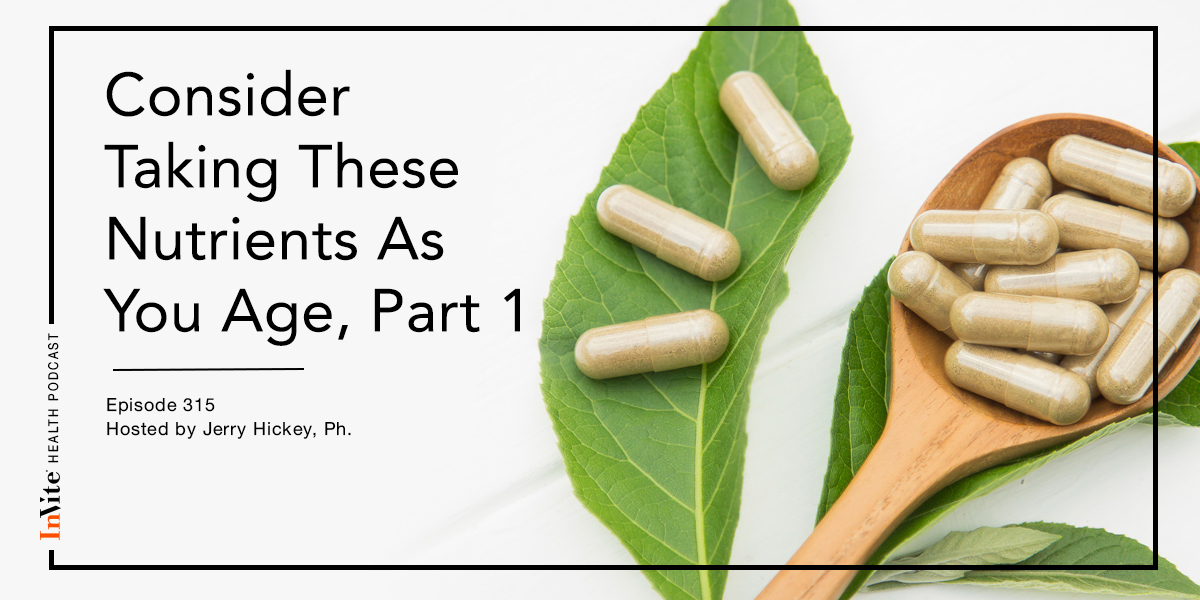Consider Taking These Nutrients As You Age, Part 1 – InVite Health Podcast, Episode 315

aging
Invite Health Podcast, Episode hosted by Jerry Hickey. Ph
Subscribe Today!
As we age, the need for certain nutrients increases for a number of reasons. We need to focus on these nutrients as we age. There’s a real need for that. This need for an increased level of supplementation is influenced by many factors, not least of which is a decreased ability to absorb and utilize different nutrients.
Factors that impact nutrient levels as you age
So what are some of these factors? First of all, eating habits often change for seniors living alone, although this is not universal. They just don’t eat as wide a variety and as rich a palette of foods as people who have people living with them. Secondly, the ability to effectively use a nutrient efficiently can decline with age. You can make up for that by taking a little bit extra of that nutrient as you age. The third factor is diseases that typically occur with aging that can affect the way you use a nutrient. You might need more of a particular nutrient because of this.†
Distinguishing Between Normal Brain Aging and Alzheimer’s Disease – InVite Health Podcast, Episode 313. Listen Now >>
Also, elderly people tend to use more prescription medications. Many prescription medications can take nutrients out of the body or increase the need for certain nutrients because they don’t work as effectively. As you age, you also have a drop in your ability to absorb certain nutrients from your food, so it can be very pragmatic and very important to add certain nutrients to your regiment as you grow older. I recommend seriously considering taking 18 nutrients as you age, but don’t let the number 18 scare you. If you get a very high quality multivitamin supplement, you can account for a number of these nutrients.†
Nutrients for Healthy Aging, Recommended by Jerry Hickey, Ph.
- Folate: This is a B-vitamin that helps with normal cell development, but also helps prevent cellular mutations. Folate may also help help to lower homocysteine, which is a byproduct of protein metabolism that can be toxic to the brain, heart, eyes and bones if its levels are too high.†
- B-12: B-12 helps you make your blood cells. It also makes your nerve cells, so it’s important for your nerves and brain. You get it naturally from animal foods like meat, fish, eggs and dairy. Most Americans get enough, but age changes that. Up to 30% of people over the age of 50 have atrophic gastritis, which makes it harder for the body to absorb B-12 from foods.†
- Vitamin D: Most people connect Vitamin D to your bones, but it is also very important for your muscles, nerves and brain to function properly. The kidneys usually activate Vitamin D, but it is so important to the immune system that the immune cells can also activate Vitamin D. As you get older, it’s harder to create enough Vitamin D on your skin and to get it through food.†
- Vitamin B6: Your immune system uses Vitamin B6 to help fight germs, but you also need it to convert food calories into energy. It’s important in the elderly to support brain health, including memory. †
How Different Types of Inflammation Impact Your Body – InVite Health Podcast, Episode 314. Listen Now >>
Hear about the rest of Jerry Hickey’s 18 recommended nutrients by tuning into the full podcast episode and stay tuned for part two of this episode coming tomorrow!
Thank you for tuning in to the Invite Health Podcast. You can find all of our episodes for free wherever you listen to podcasts or by visiting www.invitehealth.com/podcast. Make sure you subscribe and leave us a review! Follow us on Facebook, Twitter and Instagram at Invite Health today. We’ll see you next time on another episode of the Invite Health Podcast.


